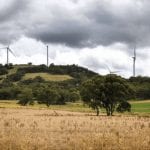Around The Web
“Fault” declared in Victoria grid as solar farm constraints drag into summer
 As heavy curtailment of Victoria's solar farms drags on, AEMO declares a "fault" shortfall that will allow for coordinated response, and puts forward new transmission ideas.
As heavy curtailment of Victoria's solar farms drags on, AEMO declares a "fault" shortfall that will allow for coordinated response, and puts forward new transmission ideas.
The post “Fault” declared in Victoria grid as solar farm constraints drag into summer appeared first on RenewEconomy.
Energy retailers get $70 million tax break on refunds for LGC shortfalls
 The federal government has granted big retailers and other obligated parties a $70 million tax break by removing the tax on refunds of large scale certificate shortfall charges.
The federal government has granted big retailers and other obligated parties a $70 million tax break by removing the tax on refunds of large scale certificate shortfall charges.
The post Energy retailers get $70 million tax break on refunds for LGC shortfalls appeared first on RenewEconomy.
Why the battle over ‘Kyoto carryover’ is such a big deal for the climate
 Push for Kyoto carryover led by Australia could dilute Paris ambition by 25 per cent, at a time when targets need to be raised.
Push for Kyoto carryover led by Australia could dilute Paris ambition by 25 per cent, at a time when targets need to be raised.
The post Why the battle over ‘Kyoto carryover’ is such a big deal for the climate appeared first on RenewEconomy.
Global engineering firm GHD concludes work on Adani's Carmichael coal project
Exclusive: GHD announcement it has ‘no ongoing contracts’ on project comes as Siemens considers backing out
The global engineering and services firm GHD has told staff it has concluded its work on Adani’s Carmichael coal project after a 10-year association with the company.
The announcement follows an intense campaign by activists, a movement of engineers to shift their industry away from fossil fuels, and significant internal pressure on management by GHD staff.
Continue reading...More wind turbines for Barnaby, as White Rock gets approval to double capacity
 Better than a lump of coal! Goldwind wins approval to double capacity of 175MW White Rock wind farm in Barnaby Joyce's New England electorate.
Better than a lump of coal! Goldwind wins approval to double capacity of 175MW White Rock wind farm in Barnaby Joyce's New England electorate.
The post More wind turbines for Barnaby, as White Rock gets approval to double capacity appeared first on RenewEconomy.
Macquarie researchers develop device to turn electric vehicles into EV chargers
 New device developed by researchers at Australia’s Macquarie University aims to tackle problem of what to do if faced with flat electric vehicle (EV) battery.
New device developed by researchers at Australia’s Macquarie University aims to tackle problem of what to do if faced with flat electric vehicle (EV) battery.
The post Macquarie researchers develop device to turn electric vehicles into EV chargers appeared first on RenewEconomy.
Blue carbon is not the silver bullet the Coalition wants it to be
Call for Nominations - Threatened species, ecological communities or key threatening processes
CP Daily: Monday December 14, 2019
World demand for coal falls despite growth in Asia
Renewables help fossil fuel’s decline in Europe and US but capacity rises in China
Global demand for coal has fallen this year for the first time in two years as Europe and the US turn their backs on coal-fired power plants in favour of cheap gas and renewable energy.
A report from the International Energy Agency (IEA) found that the world’s appetite for coal declined in 2019 after a two-year resurgence following the steepest ever drop in the use of coal-fired power plants.
Continue reading...NZ names Climate Change Commission members
Lithium Australia targets battery storage market after investment by New York fund
 Lithium Australia lands NY investment fund backing for plans to expand into battery storage market.
Lithium Australia lands NY investment fund backing for plans to expand into battery storage market.
The post Lithium Australia targets battery storage market after investment by New York fund appeared first on RenewEconomy.
Attention United Nations: don't be fooled by Australia's latest report on the Great Barrier Reef
TCI draft MOU will include multiple policy scenarios –sources
New Jersey Senate passes RGGI participation bill
Has the Emissions Reduction Fund’s well of cheap abatement dried up?
 The supply of cheap carbon abatement might be used up, raising doubt over the ability of rebadged Climate Solutions Fund to deliver on its goals.
The supply of cheap carbon abatement might be used up, raising doubt over the ability of rebadged Climate Solutions Fund to deliver on its goals.
The post Has the Emissions Reduction Fund’s well of cheap abatement dried up? appeared first on RenewEconomy.
Australia start-up designs solar car port fit for Tesla Cybertruck
 Innovative Australian clean energy building startup Iron Matrix designs solar-panelled Cybertruck carport using patented solar construction method to enhance off grid living.
Innovative Australian clean energy building startup Iron Matrix designs solar-panelled Cybertruck carport using patented solar construction method to enhance off grid living.
The post Australia start-up designs solar car port fit for Tesla Cybertruck appeared first on RenewEconomy.
Using forest therapy to restore the person and the landscape
EU’s wood-fired power should face carbon price under tougher rules -report
Number of brumbies in alpine parks more than doubles in five years
Conservationists condemn New South Wales government as feral horse numbers increase by 16,000 since 2014
The feral horse population in Australia’s alpine national parks has more than doubled in the past five years, with conservationists blaming what they have called a disgraceful lack of management by the New South Wales government.
The updated population figures come from an aerial survey of the alpine national parks and surrounding state forests in NSW and Victoria conducted in April and May of this year. It mimicked a survey of the same area in 2014.
Continue reading...


